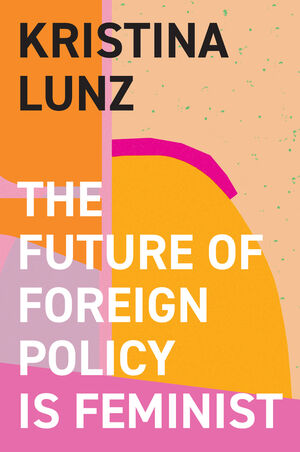The future of foreign policy is feminist
- ISBN: 9781509557837
- Editorial: Polity Press
- Fecha de la edición: 2023
- Lugar de la edición: Cambridge. Reino Unido
- Encuadernación: Cartoné
- Medidas: 24 cm
- Nº Pág.: 392
- Idiomas: Inglés

As old white men continue to dominate the national and international stages, the needs of women and minorities are constantly ignored. International politics are shaped by a ruthless competition for advantage, and the world is full of conflicts, crises and wars. Things have to change.Activist and political scientist Kristina Lunz is on a mission to do just that. In her work from New York to Bogotá, from Germany to Myanmar, she became aware of a stubborn unwillingness to think past the status quo and to embrace new, innovative voices from marginalized groups. She also saw that the tradition of feminist activism combined brilliantly with diplomacy: both require grim tenacity, boundless creativity and a solutions-oriented approach. In her attempt to reconfigure the field of foreign policy, she aims to set in motion a paradigm shift, replacing grandiose displays of military might with feminism, solidarity and climate justice. A feminist foreign policy requires the promotion of equal rights in the handling of foreign affairs and security matters worldwide, with a particular focus on marginalized and politically underrepresented groups. Ultimately, this is nothing less than an inclusive, visionary policy for the twenty-first century, one where security and prosperity, health and climate justice are possible – in other words: where peace is possible for everyone, everywhere.
Preface to the 2023 edition 1. Prologue: The personal is political My feminist awakening; …and where it led Margot Wallström: ‘Activism and diplomacy, that is, courage and patience, complement each other’ 2. Why foreign policy must become feminist The beginnings of feminist foreign policy; Feminism for everybody; Less patriarchy, more security; Feminist security beyond the nation state; Conclusion: Why (feminist) foreign policy concerns us all Toni Haastrup: ‘Home was never a place for me’ 3. Diplomacy: It’s a man’s world A rocky road; Female diplomacy in Germany; Making women visible; Oppression and violence – women’s lives past and present; Conclusion: diverse and efficient Valerie Hudson: ‘What a long, strange trip it’s been’ 4. Old white men in theory My personal sense of unease; The imperial brotherhood, or: Androcentrism is everywhere; Are humans essentially selfish?; International Relations: The revolution begins; Epistemicide – the destruction of knowledge; The postcolonial perspective; Conclusion: Old white men – a narrow outlook Nina Bernarding: ‘Gendering is a way of structuring power’ 5. The beginnings of feminist foreign policy 1915: It all began in The Hague; The women’s resolution; Delegations with a mission; 1919: A continent rearranged; Women and peace talks; From 1920: The re-emergence of hope; Feminist international law; Conclusion: The shoulders of giants Chandra Mohanty: ‘My loyalty was never to an institution’ 6. Feminist activism: UN Resolution 1325 In the UN Security Council; The idea of a feminist Security Council; United Nations Security Council Resolution 1325; The example of Colombia; The example of NATO; The influence of feminist civil society on UN resolutions; Germany’s national action plan; Demanding the maximum and negotiating compromise; Conclusion: She who fights with monsters Sanam Naraghi Anderlini: ‘Who fights for human rights? Women do’ 7. The status quo of feminist foreign policy Sweden; Canada; France; Mexico; Spain; Germany; Other states with a feminist foreign policy agenda; Staying power: The Global Partners Network; Small steps; Conclusion: The will for transformation Cynthia Enloe: ‘Where are the women?’ 8. Attacks on women’s, LGBTQI* and human rights Networking; Power over Rights; The origins of anti-gender ideology; The old, the new and the allies; Defending the international patriarchal social order; The ‘Atlas of Civil Society’; The myth of gender ideology; Antifeminist strategies; What ‘protecting unborn life’ actually means; Conclusion: An unrelenting struggle Jennifer Cassidy: ‘Old white men were teaching solely about old white men, and that made me furious’ 9. Feminist global health policy Covid is a feminist issue; The human right to health; Health diplomacy; Colonial tendencies in questions of health; Global injustices: North versus South; Sexual and reproductive health and rights; Forgotten groups in health policy; Conclusion: For a feminist global health policy Beatrice Fihn: ‘It’s absurd that force and weapons are seen as guarantors of (inter)national security’ 10. No climate justice without feminism Led by women; Climate protection: An intensely feminist issue; The climate crisis doesn’t affect everyone equally; Climate justice = human justice; Control over nature and women; The man-made climate crisis; Climate and security; Objections and attacks; Conclusion: Climate justice and feminism – now! J. Ann Tickner: ‘It doesn’t matter what the boys are doing; we’re doing much more interesting things anyway’ 11. Making peace without weapons: Disarmament as a fundamental demand of feminism My personal security flaw; The arms race spiral; Weapons kill women; Core objective: Demilitarization; Disarmament as a core feminist concern in history; A ‘no’ to the arms trade; A ‘no’ to nuclear weapons; A ‘no’ to killer robots; Conclusion: No security in patriarchy Bonnie Jenkins: ‘It’s our job to question the status quo – again and again’ 12. The future of foreign policy is feminist Hopeless: Afghanistan 2021; The CFFP manifesto; Peace and security; Demilitarization, disarmament and arms (export) control; Human rights and the rule of law; Climate justice; Development cooperation; Migration; Global health; Decolonizing foreign policy; Fighting antifeminist attacks on the human rights system; Participation and leadership; Collaboration and feminist civil society; Conclusion: Change and growth Samantha Power: ‘I want to create diplomatic progress’ 13. Feminist foreign policy in times of war and conflict Putin’s war of aggression against Ukraine; The feminist revolution in Iran; Conclusion: short-term feminist interventions and long-term feminist transformation 14. Epilogue My personal history: CFFP instead of the UN; The triple whammy; Conclusion: From angst to agency; P.S.: Only the strong stay soft! Madeleine Rees: ‘I took off my velvet gloves a long time ago’ Acknowledgements Abbreviations Notes Index






